 | Thomas Sherwin - Algebra - 1855 - 262 pages
...d, we have ad=bc. But a and d are the extremes, and 6 and c are the means. Hence, In any proportion, the product of the means is equal to the product of the extremes. (п). Suppose we have the equation ad=bc. If we divide both members by b and d, we have — = —,... | |
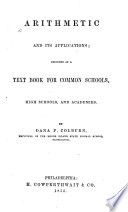 | Dana Pond Colburn - Arithmetic - 1855 - 396 pages
...obtained by dividing the product of the extremes by the other mean. (5.) Hence, in a proportion — The product of the means is equal to the product of the extremes. 161. Practical Problems. (a.) The forming of a proportion from the conditions of a problem is called... | |
 | Dana Pond Colburn - Arithmetic - 1856 - 392 pages
...obtained by dividing the product of the extremes by the other mean. (b.) Hence, in a proportion — The product of the means is equal to the product of the extremes. 161 • Practical Problems. (a.) The forming of a proportion from the conditions of a probiem is called... | |
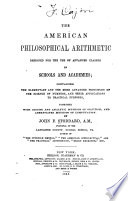 | John Fair Stoddard - Arithmetic - 1856 - 312 pages
...obtained, by dividing the fourth term by the third, we can readily deduce the following PROPOSITIONS. 1. The product of the means is equal to the product of the extremes. Therefore, 2. If the product of the means be divided by one extreme, the quotient will be the other... | |
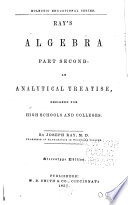 | Joseph Ray - Algebra - 1857 - 408 pages
...second, which fulfills the first condition. Then, 3a:+9 : 5x+9 : : 6 : 7. But in every proportion, the product of the means is equal to the product of the extremes. (Arith. Part 3rd, Art. 209.) Hence, 6(5a:+ff)=7(3z+9). 30a+54=21 x+63, 30a:—21a;=63—54, 9*=9, x=l,... | |
 | Education - 1863 - 746 pages
...solution of problems. Some might prefer to show how any missing term may be found, by first showing that the product of the means is equal to the product of the extremes. In that case, such a method as the following might be adopted.] T. Let us now compare the product of the... | |
 | Education - 1858 - 596 pages
...more singular still, we are told that the hitherto well-established principle, " In any proportion the product of the means is equal to the product of the extremes, is not true when the terms are denominate numbers ; thus in the proportion 4pk. : 5pk.r= $12 : $15,... | |
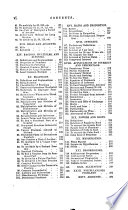 | Dana Pond Colburn - 1858 - 288 pages
...quotient obtained by dividing the product of the extremes by the other mean. (k.) Hence, in a proportion, the product of the means is equal to the product of the extremes. 105. Problems in Proportion. NOTE.— These problems may be solved by analysis instead of proportion,... | |
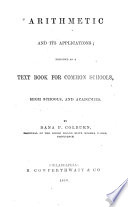 | Dana Pond Colburn - Arithmetic - 1860 - 388 pages
...obtained by dividing the product of the extremes by the oiher mean. (6.) Hence, in a proportion — The product of the means is equal to the product of the extremes. 161. Practical Problems. (a.) The forming of a proportion from the conditions of a probiem is called... | |
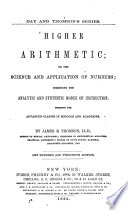 | James Bates Thomson - Arithmetic - 1860 - 440 pages
...the work is right. (Art. 500.) Demtrmtral'ian. -If four numbers are proportional, we have seen that the product of the means is equal to the product of the extremes ; (Art. 498 ;) therefore the priduct of the second and thin/ terms must be equal to that of the first... | |
| |